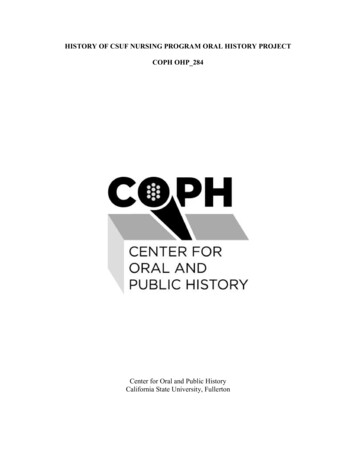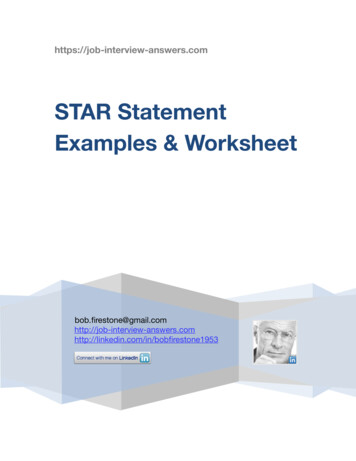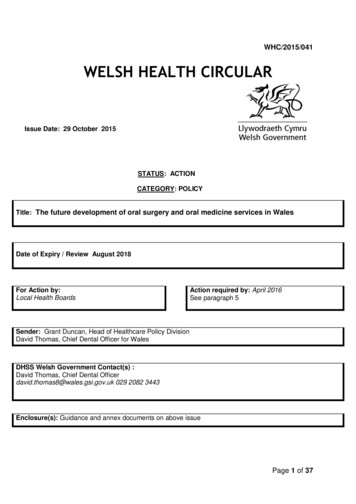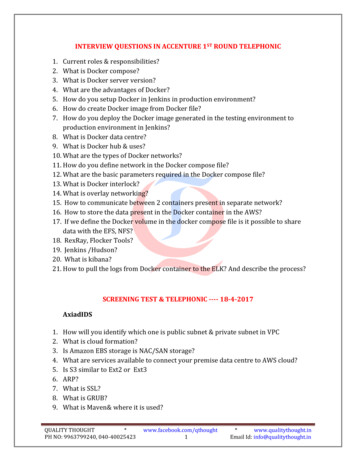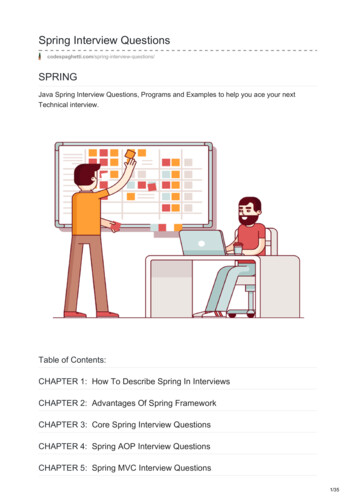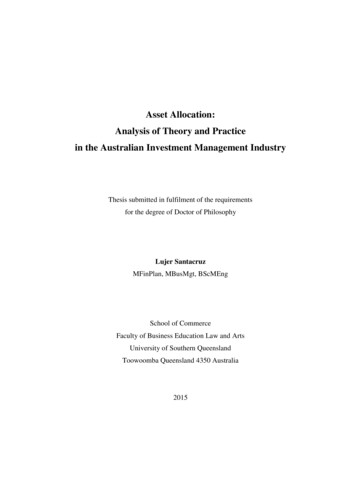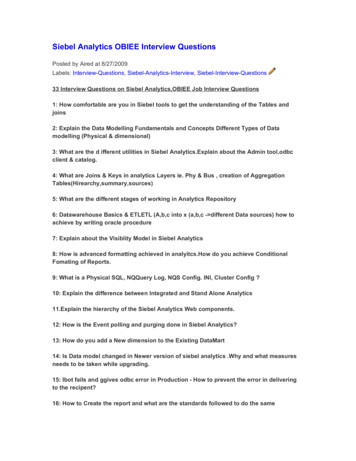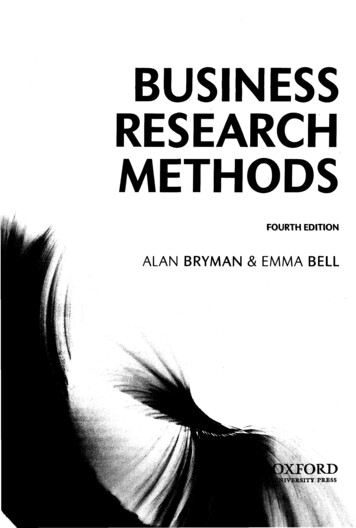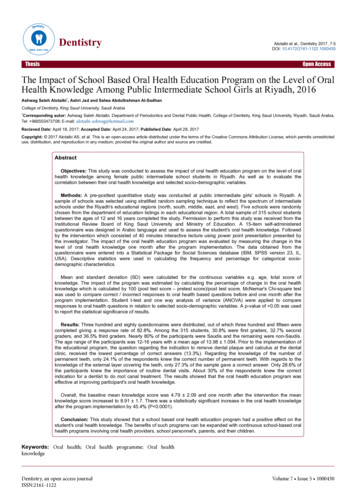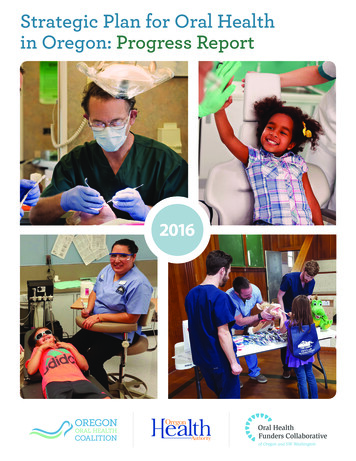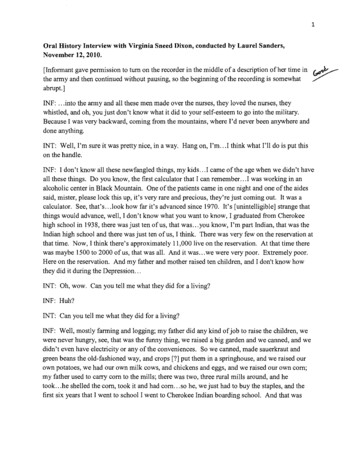
Transcription
1Oral History Interview with Virginia Sneed Dixon, conducted by Laurel Sanders,November 12,2010.[Informant gave permission to tum on the recorder in the middle of a description of her time inthe army and then continued without pausing, so the beginning of the recording is somewhatabrupt.]INF: . .into the army and all these men made over the nurses, they loved the nurses, theywhistled, and oh, you just don't know what it did to your self-esteem to go into the military.Because I was very backward, coming from the mountains, where I'd never been anywhere anddone anything.INT: Well, I'm sure it was pretty nice, in a way. Hang on, I'm. .1 think what I'll do is put thison the handle.INF: I don't know all these newfangled things, my kids . .1 came of the age when we didn't haveall these things. Do you know, the first calculator that I can remember. . .1 was working in analcoholic center in Black Mountain. One of the patients came in one night and one of the aidessaid, mister, please lock this up, it's very rare and precious, they're just coming out. It was acalculator. See, that's . .look how far it's advanced since 1970. It's [unintelligible] strange thatthings would advance, well, I don't know what you want to know, I graduated from Cherokeehigh school in 1938, there was just ten of us, that was . you know, I'm part Indian, that was theIndian high school and there was just ten of us, I think. There was very few on the reservation atthat time. Now, I think there's approximately 11,000 live on the reservation. At that time therewas maybe 1500 to 2000 of us, that was all. And it was . we were very poor. Extremely poor.Here on the reservation. And my father and mother raised ten children, and I don't know howthey did it during the Depression.INT: Oh, wow. Can you tell me what they did for a living?INF: Huh?INT: Can you tell me what they did for a living?INF: Well, mostly farming and logging; my father did any kind ofjob to raise the children, wewere never hungry, see, that was the funny thing, we raised a big garden and we canned, and wedidn't even have electricity or any of the conveniences. So we canned, made sauerkraut andgreen beans the old-fashioned way, and crops [?] put them in a springhouse, and we raised ourown potatoes, we had our own milk cows, and chickens and eggs, and we raised our own com;my father used to carry com to the mills; there was two, three rural mills around, and hetook .he shelled the com, took it and had com. so he, we just had to buy the staples, and thefirst six years that I went to school I went to Cherokee Indian boarding school. And that was
2good for my father because he couldn't afford to spend . clothe us all, buy us shoes every winter,you know?INT: How far was your home from the boarding school?INF: just about a mile, you know where Cherokee is over there .on proper. Where the agencyis; have you been over that way?INT: I've got an idea.INF: You know where the island park is. Well, that was part of the campus, more or less,because I remember crossing that river many times. The school was up on the hill, there. Andwe went to boarding school; we lived in a big dormitory. I went when I was six. And now allthe psychologists are saying what damage it did to the Indian children to send them to boardingschool, it did this, it did . .it didn't hurt me, I enjoyed it. And at that time the Indian schools werebased on the military. So I had to learn to march, and we had Reveille in the morning, to get up,and we had Taps at night. To this day, I love Taps. I can't hear it without crying. Becauseevery night about nine o'clock, one of the boys .the boys' dormitory was up on the hill. One ofthe young boys up there played Taps, at night, and it drifted down, it was so sweet, you know,you could hear it now, you'd think .and we . .it was more of an occupational school, we had tolearn to sew, weave, and all those things, you know, cook, and when I was about ten years old,I had to get up at ten years . at six, and we went to the kitchen a lot of us were assigned to thekitchen, even at that young age, and little ones like me, we'd have to cut. . the butter come inone-pound blocks . .it was real butter, too . and we had to cut it in four blocks, you know, I canremember doing things like that. And as you got older, you took on harder jobs, like making thecoffee, in a big coffeemaker, and .but we learned to do practical things. We leamed to sew,crochet, and knit, and weave, and I even took one. woodcarving one year, you know, all thosethings . and it was rather weak on academics, that was the thing. Because I only had one year ofgeometry, and one year of algebra when I graduated. But then you . when we graduated, mostof them didn't do anything, because they didn't have the money to go to college. And one ofthe . the lady that said, would you like to go to nurses' training? So she got me into nurses'training in Knoxville, Tennessee. And at that time, what helped all you had to do for the threeyears was buy your books, you didn't have to .they furnished and buy your black socks andshoes, we had to wear black shoes and socks. We had to .because they furnished youruniforms, you know? And took care of all that, your health and your food, and they looked afteryou; they were really strict to us, you know, you had to be in a certain time, you just didn't gothere and think you were going to run around, because they watched . you had to be in everynight at seven except on Friday night at eleven, and on Saturday night at eleven, and Sundaynight was ten, and all the rest of the nights, it had to be seven o'clock in the evening. So theywere. .looked after you all the . you couldn't be married, age . .I think there was a limit, I thinkthe oldest girl in our class was 28. Most of us were eighteen, twenty, like that, you know, rightout of high school. And we graduated, and I graduated in May, that's when .but we had to stay
3for three years to the day. I took two days off to take State Board, and you had to make that timeup. So I got out of nurses' training, and I was working at a little hospital in Bristol, Virginia.And the Army had already been writing to me, but I had to wait to hear about my state boards,you know, you took state boards, two days of state boards, and after I passed the army keptwriting, and it was after Pearl Harbor, just after Pearl Harbor, I thought. . I'd never heard of PearlHarbor, most of us hadn't. And it happened on a Sunday afternoon, and I was off duty, and oneof the girls said, "Come down here!" I didn't have a radio in my room; it was just radios back inthose days. She said, "Come down here and listen, something's happened. They bombed PearlHarbor!" I didn't even know where Pearl Harbor was, none of us did. So anyhow, I went down,and of course, the next day, the President, Roosevelt, declared war. And then I thought, well,I'm going in the army, you know, I thought, they need nurses, so I wrote my letter and said,"Yes, I'll come," and then they sent me orders and transportation, and I went to Camp Lee,Virginia. And I was there about three or four months, and I went up to Walter Reed. I got a rashon me, and I think it was caused from morphine. Anything that comes from opium, I'm allergicto, and back in those days it wasn't. . you didn't have all your medication in syringes where youcould just [unintelligible]; you had to take the little tablet of morphine and codeine, dissolve it inwater, hot water, and then you had to touch it, see, there was no way to pick up that tiny littlepill, and it was things . people don't realize how much easier it is being a nurse, in a lot of ways,because your medicines usually, like Demerol's and your curettes and all, they make it. .so Ithink just handling that and touching my face, I got a rash, and they sent me up to Walter Reed,and I stayed there for a month as a patient, and then they put me on limited duty at Walter Reed,and I loved it. I learned so much there; it's a big hospital, and I was in town. And then they sentme out to the convalescence section in Maryland. And we had about fifteen- to sixteen-hundredpatients, and a lot ofthem were amputees, and they had taken over a girls' school; no elevators,if you can imagine! But the young men used to .INT: Oh, how many floors?INF: Some of them had four floors, you know, the big dormitories the girls . and it wasstretched out over I don't know how many acres, and at night, if you were the night nurse, youhad to walk quite a distance to check on all your patients in different places, you know? Butyou'd probably be the only female around, and about 4,000. .1 mean there was about 1,500patients, but you had M.P.' s and all of our attendants, or aides, were black, but no one everbothered the nurses, we were just as safe there as .the men looked after you, everybody, and itwas out in the country, you know? But they really looked after you, and they took care of thenurses, and at that time I think they really. all the men in the service really looked after thenurses, especially when you were in a combat area. Then I stayed till about. .almost three years,and I requested to come off. I was on limited duty, I requested to come off limited duty becauseI wanted to go overseas, you know? And instead of sending me overseas, they sent me to thispsychiatric course, to take a psychiatric course on Long Island, which was very interesting,because it was a huge state hospital; it was a New York State hospital, on Long Island. Oh, they
4must have had thousands of patients there. But the army just took over so many of their bigbuildings to take care of the military, because when the patients came into Brooklyn NavyYard . most of them came into the Brooklyn Navy Yard in New York City.they could bringthem right out. put them on ambulances and bring them right out to the hospital out on LongIsland. And we had a lot of patients who were. some, all types of mental patients because, youknow, even in the military, you have patients that .some were psychopaths, we had a ward, alocked ward, strictly for psychopaths, because they are the ones that commit your most horriblecrimes. One man had killed his own commanding officer, and we were never allowed to go intothe day room where the psychopaths were without two or three aides, men, with you becausethey were so afraid they might bother the nurses. And I then I worked on . I was just. .wentfrom one ward to another, learning about the routine, the patients, and we had . .it was veryinteresting. We had one patient who had jumped under a taxi cab in New York City and theysent him . they decided that mentally he was not.well, they were trying to decide ifhe was fitfor the army because he hated the military so badly. And his family were a very prominentfamily in New York, and they came, and oh, they were so indignant because they said, "He justfell. He didn't jump under a taxicab; he wasn't trying to commit suicide. And we've written tothe President," and all that, you know. Because .and they said, "He shouldn't be here on thislocked ward ." this just gives you an example of how people won't accept facts . and we.and I was talking to them, I said, "Well, we're just examining him, and as soon as thepsychiatrist decides that he doesn't need to be here, they will let him out, but for his own good,we have to keep him here a while." And he was quiet and dignified, and we sent him down tooccupational therapy. And you know, on the wards, they had no . they couldn't get any sharpinstruments, we had to watch the silverware, we'd check everything, you know, in a lockedward, you have to be very careful. And as soon as we sent him down to occupational therapy,what did he do? He grabbed a chisel [makes sound effects] and just mutilated . and ifit hadn'tbeen for one of the doctors being there, and they got him on the elevator and got him to surgeryquickly.he would have lost his life. But see, families can't accept the fact that people arementally disturbed, many times. And I always felt sorry for the family, because they couldn'taccept the fact that this boy was mentally disturbed, because he didn't like the army. He wouldrather die than be in the army. Now, you find that with a lot of people that didn't like the army,and that's why it's best to give them a medical discharge, you know, they're not ever going tomake it. But they couldn't accept the fact that he had been . ended up in this mental hospital. Idon't know what ever happened, because I was just there for four or five months taking thiscourse. But there was a lot of incidents like that with the patients, which you found veryinteresting, like one young boy, he was real cute. I was out in the day room with all thesepatients, and a plane flew over, it was very close, just right over the top of the big building, andhe thought it was somebody coming to bomb us, and he said, "Oh, you shouldn't be here!" Hegrabbed me, jerked me under a table, you know, but he was trying .but you see, they'rementally. so we had a lot of interesting cases. And then I got. . when I finished my course, Ithought, well, now, they'll probably send me to a psychiatric hospital to work, and I wanted to
5go overseas. Do you know I got orders to a small hospital way up in the mountains of China?Way up, I mean to tell you. And it took me two weeks or more to get there; it seemed like,because the army takes their own good time. I flew from New York, and went to . .1 went byCasablanca, missed a plane there, and flew over to Karachi, India and stayed there two weeks.[unintelligible] my orders were holding up, but I stayed in Karachi two weeks. Went acrossIndia, finally, and got to a place they called Chaoboi [?], I don't know what it is now. And youfly over the hump, you know? You wouldn't know, because you're too young.they called thehump.these planes from India would fly to China, and you'd have to go way up above theHimalaya Mountains. And we had to go over to Kunming, and I was the only girl; I started outwith two or three, and when I got there, one of them had gotten sea. airsick, and she was let offin Cairo, I believe. But anyhow, I was the only girl. I traveled so far, but just me among allthese men, you know? And I got. .we got over to Kunming, China, finally, after we left thatmorning. Took us several hours across the hump, where the mountains are just covered in snow,and you get up so high, and we . the planes weren't pressurized. But when you got up to about28,000 feet, the oxygen mask would drop down, so you'd have to wear oxygen because it wasthat high. And ice was freezing on the wings of the plane, you know? And we got to Kunming,and they said, "We have so many planes circling, you can't land. You have to go back." Soback we went across that hump, and back . and landed, and I spent another night in what theycalled Chaoboi, India. The next morning we went again, but we made it, that day. And I wentout. . they had a 95 th Station hospital, and I went there for two weeks, and I noticed, about thesecond or third night, that my legs were just itching, itching, and I looked .oh, I had a millionbumps on my legs, I thought, "What is wrong with my leg?" You know what happened? WhenI was in India, I wore hose. Didn't wear pants or boots, wore hose, and watched an outdoormovie, and I got malaria.INT: What movie? It's not important, but. .INF: I was there, and I went up to .they assigned me to the 22 nd field, that's where I wassupposed to go, and that was above Kunming, about. .was it 200 miles? Way up in themountains, a little hospital on the Burma Road. Field hospital on the Burma Road. And I hadn'tbeen there about two weeks and I started getting so sick, my temperature skyrocketed in thenight, I'd have chills . well, I knew that it was malaria. And they couldn't find he bug in mybloodstream, and we had a doctor Yi, who was a Chinese-American from San Francisco whowas our head doctor. And he said, "I will run the next blood work. When she has a chill, let meknow, so that when . " and I had to stay in my tent, see, we were in tents, and .INT: Oh, wow, was it cold?INF: No, it was warm, see, it was way up the mountains, but. . l 0,000 feet, but it wassummertime and hadn't got cold yet. And so, anyhow, they found malaria, and I had seenpatients with malaria, and thought, oh, I can control those chills, but when the chills come, youjust shake, and after the chill leaves you, you usually start your elevation of your temperature.
6And that's when they want to take the blood to see ifthey can find the malaria, and I hadmalaria, and so they treated me with the [unintelligible], so in about two weeks I was fine. ButI've never had another attack, which is good, you know? And so I was only there about four orfive months, and then the war was over. See, World War II had already been over in Europe in'45, May '45. And when I . so then they started sending everybody home according to howmany points you had. And I left there in October, I believe. '45. And I went down to .theysent me down, because . to Calcutta, India, and I stayed there a month waiting on a ship, becauseCalcutta. you don't. .when you get out, you find out a lot more about geography. .it's not onthe ocean. So the ships have to come up the Hugli River as the tide comes up, see? They have towait for the tide. And it takes it about. . .I don't know how long it took us, going out. I think twodays. Because you go so far, and I think . .I guess they drop anchor, I can't remember. . andthen when the tide goes out, and then they wait for the tide to come back. flood the river, andthen finally you get down to the ocean. It took us two days, I believe. And then I came home bythe way of.we didn't get off the ship, they wouldn't let us . we got on the ship in Calcutta, andwe didn't get off the ship until we got to New York City. And we came through the IndianOcean. It's the most beautiful ocean, oh, you just can see about thirty feet straight down; it's justso blue, I've never seen an ocean so blue. And then we. you come up through the Suez Canal,and through the Mediterranean, and then we started hitting the storms, you know, because it wasDecember when we got out in the Atlantic Ocean, and it was rough. And have you ever been ona ship in a storm?INT: No.INF: Well, the first season I got real seasick. I was working in sickbay, and all the sailors said,"Now you have to eat, or you'll get sick. Go up to eat when it's time for you to eat." I said,"Okay." Well, I got to the door and was standing in line for the door to open ,and then whenthey opened the door out came all this smell of food, and you just. . .I just ran back to thebathroom, you know? Because you get so seasick. But after the next morning, I was over it, butit was a rough night. But the ocean, that storm lasted about four or five days, and the ship wouldjust roll over. You couldn't even stay in your bunk, hardly, and I was in the upper bunk. Butanyhow, we came into New York. And I got out of the Army; I was going to get married andthat didn't work out, so I was out, and I worked several places around, I worked at Oak Ridge,Tennessee, and where else did I work? Two or three places. And I'd always loved the army, soI decided I would go back. Oh, I started going to Western. At that time, they had no courses fornurses' degrees or nothing, you know. They didn't know how to treat nurses. And I decided Iwould go back to went up to Western that fall, and I was doing pretty good in my grades, allexcept what was philosophy. And algebra. And I didn't have a good basis for algebra. Andphilosophy, Ijust couldn't understand it, so the . one of my advisors said, why are you makingthree straight A's in your other subjects and you only have a D in philosophy, and I said, well, Iguess I've looked at man so long from the physical side, I can't see the philosophical side.[laughs] And he thought that was so funny!
7INT: [laughs] I'm sure.INF: I said, I've looked at him from the physical side.but anyhow, and then I decided to goback into the military. And I was assigned to Fort Bragg, to the 171 Evac hospital at Fort Bragg.But when you're not set up as a hospital unit, you're put out to different places to work. Like, Iwas assigned to the station hospital at Fort Bragg, but when we went. . when they needed ourhospital unit for maneuvers, then we would all go with our hospital unit out on maneuvers, and Iwent out on maneuvers down at Fort Bragg twice, out in the field where you live in tents, youknow, and then, I think it was 1950, we were assigned to go and set up a hospital in Beacus [?]down in the islands, you know. Down in Puerto Rico, down there. We were assigned. Soanyhow, they didn't put us on a troop ship, we were on a hospital ship. All the nurses . theyalways see that you're taken care of, so they couldn't put us on a troop ship or anything, becausethey didn't have room for us. With our hospital units, you know. And they put us on a hospitalship. And we sailed from Norfolk down to the Caribbean, and we sailed all over the Caribbean.Everywhere, we kept waiting for our hospital to notify us to come and set up the hospital unit.Well, we didn't. I learned to play canasta, and ate, and sat on the deck, for a whole month, it wasjust a beautiful vacation, but we never got to land. But finally they sent for us to come the VA,because, well, we thought we were going to set up a hospital, you know. We all got our stufftogether and climbed down the rope ladder and out in the ships, boats, that they took usover. . well, they just wanted us to see the island, but they weren't going to set up the hospital, sowe all had to go back and climb back on the ship, the hospital ship, and came back to Norfolk. Itwas just a nice month of vacation, more or less. But then when the Korean War was declared,my whole hospital unit was given orders to go to Korea. And we were stationed at Fort Bragg,and everybody was there. We didn't have our doctors, because, you know, doctors wereprecious, and they just couldn't send . so we all got on the troop ship down to Fort Bragg, andwe went all the way across the United States on this troop ship. Our hospital unit set up andcooked the food on the ship, and we were. of course, the nurses had berths, you know, and wehad . it took us a month; I think it took us a month.INT: The nurses had what?INF: Berths, you know, sleeping quarters. B-E-R-T-H. [laughs]INT: Okay. [laughs] Excuse me, go on.INF: So we just had a good time going across, and we left and went by Chicago and across,down. and I'd never been through the West, and it was a very nice. .I don't know how long ittook us. I was trying to remember.because we couldn't get off of the train. Everybody had tostay on the train. Because they were so afraid somebody'd get off and they wouldn't get back,you know, and all that . so then we got to . Stoneman in California? It's been so long.Anyhow, we all go there, my whole hospital unit, and I guess we were only there a few daysbefore they loaded the whole unit on a troop ship, you now, sailing out of San Francisco. So we
8went from San Francisco to Yokohama, Japan, by ship. And we went down to southern Japan,and now I can't think of that city. And then from there, I think we flew over to Korea. And wewent to Taegu first. And that was soon after all these units had been pushed back, and therewere so many units there . .1 was trying to remember. .how far did .we stayed there a month, Ibelieve. You know, when you . and then we got orders.my hospital unit got orders to go toPyongyang. The Americans had pushed back the North Koreans to Pyongyang, North Korea.So we went to Pyongyang, North Korea, and we set up our hospital in this . .it had been a Koreanhospital, but they had mutilated it before we got there, like, they had knocked out the windows,and there was no heat, there was no water, it was just a shell, you know? And we set up ourhospital unit there, and the nurses . .1 think we lived on the second floor of this old building, andwe just had cots, you know, little cots, like you'd use in the field, in the military, for yourpatients. [unintelligible] You don't have a mattress or anything, you know? We usually foldeda blanket for a mattress to sleep on. And we set up our hospital unit there, and we started gettingpatients from North Korea, farther north, troops, and it got. . when the Chinese invaded, they.ofcourse, we got a lot of patients, and they were always in shock, because they had to bounce overthose rough North Korean roads, and they were bleeding, and we just never got some of them outof shock. And the operating room went 24 hours a day, and you tried to . you'd do the best youcan with what you had, and of course, we all were on K-rations, but luckily, our kitchen .theywould take all the K-rations that came into our hospital unit for all the people that worked there,and for the patients, too, and they would cook the meals, and if you can imagine cooking out inthe field with these little stoves and everything. the food was terrible, but that's the best you cando in the field when you're trying to take care of patients and feed them. And it was just bad,because we didn't have heat, was the big thing. We had little tiny stoves in the hospital, and theynever kept the place. and when you've got patients in shock, you want them warm, but youcan't. . .it was never warm enough. I do think they had blowers for the operating room, wherethey went 24 hours a day. But I just felt so bad, because I know that some oHhese young mencould have been saved if we'd had warm places for them. But when you don't have, you do thebest you can. And everything. And as I said, one of the funniest incidents to happen to thenurses . we lived, I think we were on the second floor of this old building and somebody wasshooting guns off all night, we. .I think they were Taiwanese [?] or one of those . the peoplethat were guarding the hospital. And somebody with the gun, and we had to go outside to thelatrine, you know, because we had no facilities. And so I said, "I'll never go outside in this darkwith all those people out there shooting off guns." And I said to my friend, "If I have to go, I'llwake you up and if you have to go at night, wake me up." So we did that. . well, it was so funny,one of the nurses said, "I'm not going out there to the latrine in the middle of the night," and shegot her a bucket. And with these little stoves . .it was real cold at night. . she backed up too closeto it, and you know what happened? She burned her rear. We laughed about that for days. Youknow, it's one of those funny things. I can still see her. She was so funny. She backed up tooclose to the stove, so . .i t was things like that. It was just so cold. You never got warm.Even . you wore all these. .1 wore.most of us . .1 just hate wool. The army would give you
9wool underwear. We ordered from Sears, you know, the . .it was pink! But it wasn't wool; I canstand . a lot of us ordered that to wear under our uniforms. And you had the pants and the shirtand usually you wore a jacket. Because it was so cold. But then the Chinese invaded, and Idon't know how long we'd been there. A month? I guess about a month. And they camearound and said, "Get ready, get ready. You have to leave today. The nurses have to leave now,this afternoon. Because the Chinese are coming and we don't want you females to be here." Sothat meant we had to leave our patients and everything. So we had to rush and get ready toleave, and we were at the airport that night, and it was 141, I think we had one Red Cross girlwith us, and the nurses, and our commanding nurse, who was Colonel Bradley, and firstshift.first plane got off earlier, about seven thirty. And the last of us, about twenty of us, werewaiting for the next plane to come in. And we got on the plane and then they were tying downthe luggage [unintelligible]. When you ride on C47s, I don't know if you know that, but it wasthe workhorse of the Air Force, and when you got on there you had seats down each side. But inthe middle, they had put our luggage. We had all carried our helmet, and we had little olive drabknit caps that we wore, when we worked, most of us did. And . but we always had our helmetnear. The helmet is the most useful thing the army had. We cooked in it, we washed in it, and itprotected us when we needed, it, you know? And we all kept. . .I remember one morning, wecouldn't heat water because we had no hot water, but I managed to heat a bucket of water on thislittle stove. And I went around and I poured about that much into each man's helmet, any patientthat I had's helmet. And I gave this one guy, and he said, "Oh, that's the nicest thing that'shappened to me in many a month." He said, "I can shave, because I've got some hot water."And can you imagine, it just made me cry, because here he was, so thankful for six inches of hotwater, you know. Just little things like that, I remember. And I wish I could have done more,but you just don't have it, you know, when you have to carry the water up three flights of steps.Out in the field, everything is different. You can't tum on a faucet. And we had water trucks;the hospital unit had water trucks. Well, first you've got to find the water, the source of water.So that water trucks will go out right away, and when we set up anywhere, to find water. Andthey would fill the truck with water. Then they have to purify it. See, that's the second thing,you have to purify the water. And then you have five-gallon water cans, they look like[unintelligible], but they're water. And when you need water everywhere in a field hospital, likewas it that time, you took your water cans and filled up your water cans and brought the
Oral History Interview with Virginia Sneed Dixon, conducted by Laurel Sanders, November 12,2010. [Informant gave permission to tum on the recorder in the middle of a description of her time in the army and then continued without pausing, so the beginning of the recording is somewhat . abrupt.]
